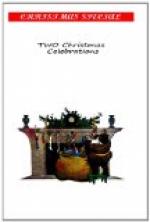THE TWO CHRISTMAS CELEBRATIONS,
A.D. I. and MDCCCLV.
A Christmas Story for MDCCCLVI.
By Theodore Parker,
Minister of the 28th Congregational Society of Boston.
Two Christmas Celebrations.
A great many years ago, Augustus Caesar, then Emperor of Rome, ordered his mighty realm to be taxed; and so, in Judea, it is said, men went to the towns where their families belonged, to be registered for assessment. From Nazareth, a little town in the north of Judea, to Bethlehem, another little but more famous town in the south, there went one Joseph, the carpenter, and his wife Mary,—obscure and poor people, both of them, as the story goes. At Bethlehem they lodged in a stable; for there were many persons in the town, and the tavern was full. Then and there a little boy was born, the son of this Joseph and Mary; they named him JEHOSHUA, a common Hebrew name, which we commonly call Joshua; but, in his case, we pronounce it Jesus. They laid him in the crib of the cattle, which was his first cradle. That was the first Christmas, kept thus in a barn, 1856 years ago. Nobody knows the day or the month; nay, the year itself is not certain.
After a while the parents went home to Nazareth, where they had other sons,—James, Joses, Simon, and Judas,—and daughters also; nobody knows how many. There the boy Jesus grew up, and it seems followed the calling of his father; it is said, in special, that he made yokes, ploughs, and other farm-tools. Little is known about his early life and means of education. His outside advantages were, no doubt, small and poor; but he learned to read and write, and it seems became familiar with the chief religious books of his nation, which are still preserved in the Old Testament.
At that time there were three languages used in Judea, beside the Latin, which was confined to a few officials: 1. The Syro-Chaldaic,—the language of business and daily life, the spoken language of the common people. 2. The Greek,—the language of the courts of justice and official documents; the spoken and written language of the foreign traders, the aristocracy, and most of the more cultivated people in the great towns. 3. The old Hebrew,—the written and spoken language of the learned, of theological schools, of the priests; the language of the Old Testament. It seems Jesus understood all three.
At that time the thinking people had outgrown the old forms of religion, inherited from their fathers, just as a little girl becomes too stout and tall for the clothes which once fitted her babyhood; or as the people of New England have now become too rich and refined to live in the rough log-cabins, and to wear the coarse, uncomfortable clothes, which were the best that could be got two hundred years ago. For mankind continually grows wiser and better,—and




